| Srl | Item |
| 1 |
ID:
192552


|
|
|
|
|
| Summary/Abstract |
As far as space technology cooperation is concerned, China and Russia took the Ukraine crisis in 2014 as the dividing line. The content and methods of cooperation between the two countries have undergone significant changes, making the cooperation from simple to complicated. Meanwhile, the space technology cooperation between China and Russia will definitely shape the structure of power in space geopolitics among China and Russia and US, which helps to create a balance of power and prevent the emergence of a Kindleberger trap in space geopolitics, but to a certain extent, will in turn restrict China-Russia space technology cooperation and have an important impact on China-Russia strategic partnership of coordination. The deepening of space technology cooperation between China and Russia may increasingly show the nature of power competition in space geopolitics.
|
|
|
|
|
|
|
|
|
|
|
|
|
|
|
|
| 2 |
ID:
068890


|
|
|
| 3 |
ID:
086599
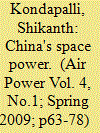

|
|
|
|
|
| Publication |
2009.
|
| Summary/Abstract |
Professor Srikanth Kondapalli has argued that "one of the motives behind the development in China's space programme, albeit generally not mentioned explicitly, is for military usage." China became the first country in the world to have tested explicitly a land-based missile to destroy a space-based object on January 11, 2007. This ASAT test has led to concerns in Asia, with objections raised by Taiwan, Japan, South Korea, India and by others such as the US, Russia and the EU countries. This has the potential to initiate a further arms race in space and contribute to the destabilisation trends.
|
|
|
|
|
|
|
|
|
|
|
|
|
|
|
|
| 4 |
ID:
147525


|
|
|
|
|
| Summary/Abstract |
China's manned space station project was officially approved in September 2010. Under a space development strategy at the state-level, an unmanned modular space station, Tiangong-1, was launched on September 29, 2011 and Tiangong-2 is scheduled to be launched in 2016. According to the China National Space Administration (CNSA), China is targeting 2022 for the orbiting of its space station, which will establish China as the third country that has independently constructed and operated a space station. In this article, the feasibility of different models of jurisdiction for this space station is examined, namely the Soviet Salyut, Sino-ISS, European Space Agency (ESA), and China-led models, which take into account the various factors that are not only limited to legal issues. After exploring the advantages and limitations of these models of jurisdiction, it is argued that due to legal, political, financial and technological reasons, a model of jurisdiction that is led by China is the ideal model for the impending space cooperations of China. Based on the above proposition, it is concluded in this article that China should be pragmatic towards space legislation in terms of space commercialization, and the most critical legal issues need to be given prior consideration, i.e. intellectual property protection, export control and dispute resolution mechanisms.
|
|
|
|
|
|
|
|
|
|
|
|
|
|
|
|
| 5 |
ID:
130177
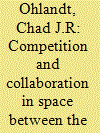

|
|
|
|
|
| Publication |
2014.
|
| Summary/Abstract |
U.S. national security space policy has recently shifted significantly toward increased international cooperation. Australian space activities have been reinvigorated, but remain underfunded. China's space activities remain vigorous, but largely unilateral. Given U.S. policy changes, opportunities for cooperation and collaboration among all three have improved.
|
|
|
|
|
|
|
|
|
|
|
|
|
|
|
|
| 6 |
ID:
169355


|
|
|
|
|
| Summary/Abstract |
Space collaboration has become quite common in recent years, thanks in large part to the high cost of such endeavors. This article reviews a rather early example of space collaboration, the partnership between China and the United States (U.S.) during the period 1978–2000. The collaboration began with general discussions and grew to include the use of Chinese rockets to launch U.S. satellites into orbit. We discuss where this collaboration worked successfully, where it did not, and why it ended. The ultimate collapse of the collaboration highlights the complexity of joint international projects for the factors that caused failure included the Cold War dynamic of geopolitical competition for international military and economic dominance and its continuance into the 1990s in Sino-U.S. relations; the domestic political landscape in both countries, which included bitter Democratic-Republican party rivalries in the U.S. and the top-down centralized decision-making system in China with significant influence by the People's Liberation Army; and the economic interests of U.S. aerospace contractors. But the issue that most directly ended cooperation in space was U.S. concerns about the transfer to China of sensitive satellite and rocket technology. For this history, we draw upon existing English language materials and Chinese language sources that have not been available to English-speaking scholars to illuminate China's involvement in this collaboration. We also describe subsequent Chinese space activities to pursue additional collaboration and offer comments about possible future Sino-U.S. space cooperation, against this backdrop of long-running national security concerns about transfers of knowledge and technology.
|
|
|
|
|
|
|
|
|
|
|
|
|
|
|
|
| 7 |
ID:
147745
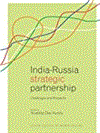

|
|
|
|
|
| Publication |
New Delhi, Academic Foundation, 2010.
|
| Description |
167p,: tables, fighureshbk
|
| Standard Number |
9788171888276
|
|
|
|
|
|
|
|
|
|
|
|
Copies: C:1/I:0,R:0,Q:0
Circulation
| Accession# | Call# | Current Location | Status | Policy | Location |
| 058812 | 327.54047/KUN 058812 | Main | On Shelf | General | |
|
|
|
|
| 8 |
ID:
014210


|
|
|
|
|
| Publication |
Aug 1992.
|
| Description |
195-203
|
|
|
|
|
|
|
|
|
|
|
|
|
|
|
|
| 9 |
ID:
053593
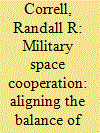

|
|
|
| 10 |
ID:
074785


|
|
|
|
|
| Publication |
2006.
|
| Summary/Abstract |
Since the late 1990's the United States has maintained a strict policy of no cooperation with China on space activities. The reasons for that are several, including the desire to inhibit the development of dual-use technology considered potentially threatening to the United States and political reluctance to work with a communist country. Increasingly, however, it has become clear that policy is not constraining China from dual-use technology development and that the policy overall may be detrimental to U.S. security interests. Therefore a policy change, from a realistic consideration of circumstances, must be considered.
|
|
|
|
|
|
|
|
|
|
|
|
|
|
|
|
| 11 |
ID:
013836


|
|
|
|
|
| Publication |
May 1992.
|
| Description |
10-15
|
|
|
|
|
|
|
|
|
|
|
|
|
|
|
|
| 12 |
ID:
164098


|
|
|
| 13 |
ID:
147522
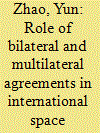

|
|
|
|
|
| Summary/Abstract |
International cooperation has been successfully conducted in a wide range of areas in the space field. Over the past years, many bilateral and multilateral agreements have been concluded, providing solid legal basis for space cooperation. This article examines the important role of these agreements in the process of international space cooperation and put forward suggestions on how to further facilitate the conclusion of international agreements so that international space cooperation can be carried out more effectively. The article concludes that international agreements are important tools to realize international space cooperation and that we will need to further study possible means to promote international space cooperation in wider scope through the conclusion of international agreements.
|
|
|
|
|
|
|
|
|
|
|
|
|
|
|
|
| 14 |
ID:
073751


|
|
|
| 15 |
ID:
101231


|
|
|
|
|
| Publication |
2010.
|
| Summary/Abstract |
Obama Administration officials have indicated that international cooperation will play a greater role in their national space policy than it did during the Bush Administration. But they have not provided a clear and consistent logic specifying why the United States wants more space cooperation, what types of cooperation it will pursue, and how it will convince other countries to agree on, and comply with, accords that produce the desired policy results. Instead, their policy about space cooperation mixes elements from three different and somewhat contradictory strategic logics: a "Global Commons" logic, a "Strategic Stability" logic, and a "Space Governance for Global Security" logic. While each logic has attractive features, the Global Commons logic is unlikely to achieve significant results in a short period of time, while the Strategic Stability logic is more likely to promote competition, rather than cooperation. Following the Space Governance for Global Security logic could yield much larger dividends by using positive and negative forms of space cooperation to gain widespread support for the equitable rules and effective international institutions needed to address the central challenges identified by the 2010 National Security Strategy.
|
|
|
|
|
|
|
|
|
|
|
|
|
|
|
|
| 16 |
ID:
052621


|
|
|
| 17 |
ID:
132567
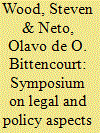

|
|
|
|
|
| Publication |
2014.
|
| Summary/Abstract |
In the spirit of the diversity of the many nations currently engaging in exploratory, scientific and technical endeavors in outer space, representatives from all BRICS countries and their respective or potential European collaborators gathered for the "Symposium on Legal and Policy Aspects of Space Cooperation between Europe and the BRICS Countries". Held on 16 May 2013, the Symposium took place in the Netherlands at Leiden University, and was jointly organized by the International Institute of Air and Space Law of Leiden Law School and the Department of Latin American Studies of Leiden University's Faculty of Humanities
|
|
|
|
|
|
|
|
|
|
|
|
|
|
|
|
| 18 |
ID:
014208


|
|
|
|
|
| Publication |
Aug 1992.
|
| Description |
205-220
|
|
|
|
|
|
|
|
|
|
|
|
|
|
|
|
| 19 |
ID:
071030


|
|
|
|
|
| Publication |
2005.
|
| Summary/Abstract |
Attempts to address the transatlantic capabilities gap in military space is complicated by the rivalry between NATO and the European Union's ambition to undertake a greater role in European security, as well as being held hostage by the extent and nature of the EU's role in this crucial policy area. In light of this, transatlantic military space cooperation is likely to be modest and on a bilateral basis between Washington and the various European capitals, though NATO may yet play a larger role in this area.
|
|
|
|
|
|
|
|
|
|
|
|
|
|
|
|
| 20 |
ID:
068825


|
|
|